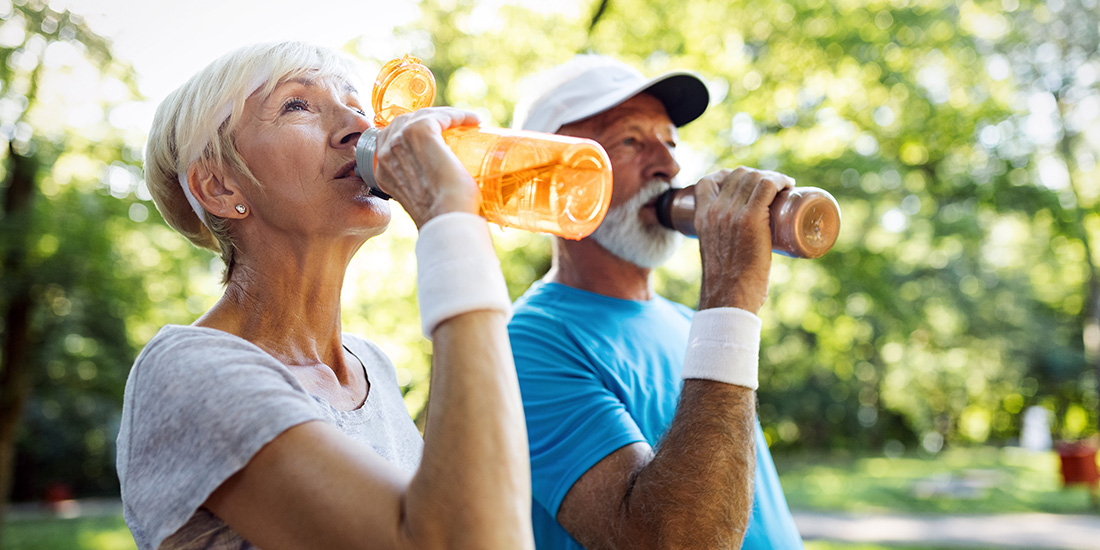 Contact
About Us
Articles
Home
Contact
About Us
Articles
Home

In older adults, dehydration occurs more frequently and is a factor in many health issues. In many cases, these individuals don’t recognize they are dehydrated.
Even mild dehydration can snowball into significant health complications. Hydration, in the simplest of terms, is the balance of water and electrolytes in the human body. Water makes up about 70% of the human body's weight and its importance cannot be underestimated.
Water is a critical component in all bodily functions and the body works constantly to maintain just the right balance for optimal performance. Too much water can result in overhydration and too little water results in dehydration.
Overhydration is a concern but occurs much less frequently in the older population. Causes of overhydration can be chronic illness, malnutrition, fluid retention, kidney diseases and complications of alcoholism. Some medications and certain diagnoses, such as schizophrenia, may cause patients to perceive thirst differently or have increased thirst.
It’s often said that “you are what you eat” but what you drink is important too. Water is involved in just about all physiologic processes in the body.
The list goes on, but it’s easy to see that dehydration or lack of adequate hydration impacts the entire body!
Lots of things impact the fluid and electrolyte balance of the human body. The body’s hydration status depends on water intake from foods and drinking, water loss from vomiting and diarrhea, salt intake, metabolism, blood loss and certain medications such as diuretics. Lots of times dehydration is a combination of several of these factors.
Dehydration is the most common fluid and electrolyte disturbance in older adults. It is a frequent cause of hospitalization. Its onset is insidious and sometimes symptoms are missed. Keeping in mind that hydration or fluid balance is important in all body functions, it is easy to see how even a small reduction in water can result in big changes in health. Dehydration is often implicated in increased morbidity for older adults.
Dehydration is one of the top ten reasons for hospitalization in the elderly and a frequent factor in ICU admissions.
Many physiological changes occur with aging and impact the body’s total water amount. Older people have about 60% body water as compared to 70% in other adults due to muscle loss and general loss of fat-free body mass. Another reason is decreasing thirst sensations, and older people may not realize they are thirsty. Kidney function may decrease, and as a result, allow more water to be excreted.
Older people often also take diuretics which increase fluid loss. And then there is also the very real fear of older adults of being incontinent. Some older adults may deliberately go all day without drinking on an outing due to fear of not being able to access a bathroom. Older adults also tend to have a higher rate of medical conditions such as diabetes, which often cause frequent urination.
Living conditions also play a role. Some older adults are dependent on caregivers for everything, including getting them a drink. Some older adults have difficulty swallowing thin liquids.
Mild dehydration is defined by a weight loss of 2 to 5% and is characterized by dry mouth and thirst. Older adults may not recognize being thirsty due to a blunted thirst response and may not notice a slight weight loss. Many medications cause dry mouth so this symptom may be missed as well.
Mild dehydration can progress quickly to more severe dehydration which can be a medical emergency.

If mild dehydration is untreated and it progresses, serious complications can occur. Death can occur if water loss exceeds 15% loss. The blood is primarily water so with dehydration there is a great loss of circulating blood in the body. As a result, there are fewer nutrients, less oxygen to the brain, cardiac output falls due to reduced fluid volume, and all body systems are impacted negatively. Symptoms of severe dehydration include severe weight loss, elevated body temperature, reduced cardiac output and kidney failure. Death is usually related to cardiac, brain or kidney damage.
Mild dehydration can progress rapidly to severe dehydration depending on the cause. Severe bleeding, diarrhea and vomiting can contribute to rapid and severe dehydration.
Every household or caregiver should have a plan and be aware of the symptoms of dehydration in their loved ones. It is very important to pay attention to signs of beginning dehydration because it can progress very quickly.
Certain patients are at increased risk due to diagnoses such as dementia and diabetes, and also due to medications.
Caregivers should assess frequently the following:
If initial symptoms are missed and dehydration progresses, the caregiver should note the following as warning signs:
Increased confusion in a dementia patient is often a sign of dehydration.
The best thing to do if a person is experiencing mild symptoms, is alert, oriented and can drink water, is to give the person a glass of water and see if the symptoms improve. If the symptoms improve, consult an appropriate provider for guidance and to rule out any other conditions contributing to possible decreased fluid intake or fluid loss.
If the patient is experiencing symptoms of more severe dehydration such as irritability, fainting or acute confusion, then seek emergency treatment. Dehydration can be accurately diagnosed in the ER by bloodwork as urine tests are not always reliable with older adults, and appropriate treatment initiated for the treatment of symptoms.
Knowledge of dehydration is critical when caring for an older loved one. There should always be a dehydration prevention plan in place when caring for older adults.
Some strategies to implement are the following:
The first step in preventing mild dehydration or its progression to a more severe form is being able to recognize the symptoms. The second step is creating a plan or implementing that plan when dehydration is suspected. Dehydration is preventable and treatable when it’s recognized and addressed early. When left unchecked, dehydration can cause serious health complications and death.
Alliance America is an insurance and financial services company. Our financial professionals can assist you in maximizing your retirement resources and achieving your future goals. We have access to an array of products and services, all focused on helping you enjoy the retirement lifestyle you want and deserve. You can request a no-cost, no-obligation consultation by calling (833) 219-6884 today.


